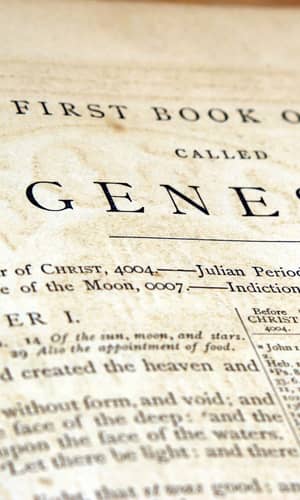Professional, peer-reviewed papers discussing the Book of Genesis and its biblical, theological, anthropological, and historical teachings and implications.

Creation and Time in the Early Church Fathers: Looking to the Patristics for Guidance in the Genesis Debate
Jonathan E. Cook • Nov. 5, 2025
This study examines early Church Fathers’ writings on three meanings of “day,” noting only the 24-hour view endures in modern Protestant thought.

Mitigating Exaggerated Claims: An Evaluation of the Arguments for a Hyperbolic Interpretation of the Noahic Flood
Diego R. O. Ramos • Oct. 1, 2025
This paper evaluates Tremper Longman and John Walton’s claim that the Flood Narrative in Genesis uses hyperbolic language to portray a historical local flood as a global cataclysm.

The Textual Superiority of the Masoretic Text of Genesis 5 and 11
Lita Sanders • April 30, 2025
Currently, there is a textual debate in creationist circles regarding whether the Masoretic Text (MT) or Septuagint (LXX) preserves the correct chronology in the genealogies of Genesis 5 and 11.

Genesis 1:1–2 and the Doctrine of Creatio Ex Nihilo (Part 2): A Lexical Analysis of the Phrase תֹֹּהוּ וָָבֹֹהוּ
Dr. Joshua D. Wilson • Feb. 12, 2025
Creatio ex nihilo is a logical inference from Genesis, and lexical analyses of Parts 1 and 2 demonstrate that traditional interpreters and theologians are on sure lexical footing when arguing for it.
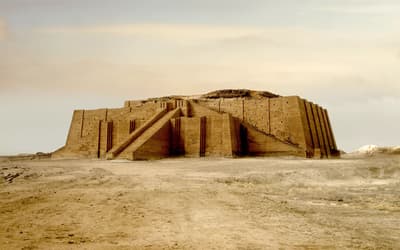
Where in the World Is the Tower of Babel? Comments
A. John M. Osgood • March 13, 2024
This is the first of a three-part series. This first paper discusses Habermehl’s 2011 paper, “Where in the World is the Tower of Babel?”

Genesis 1:1–2 and the Doctrine of Creatio Ex Nihilo (Part 1): A Lexical Analysis of the Phrase אֵת הַשָּמַיִם וְאֵת הָאָרֶץ
Dr. Joshua D. Wilson • June 7, 2023
In the debate over the proper interpretation of Genesis 1:1, the key issue is over the meaning of a compound phrase.
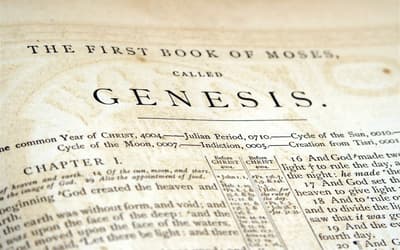
A Generic Response to William Lane Craig Concerning Genre and Genealogies in Genesis
Donald C. McIntyre • Dec. 21, 2022
This article will seek to show that the proper genre of Genesis 2:4ff is historical narrative and not mytho-history.

Using Stromatolites to Rethink the Precambrian-Cambrian Pre-Flood/Flood Boundary
Ken P Coulson • May 5, 2021
Many creationists are actively engaged in finding the Flood/post-Flood boundary, but most creationists consider the Precambrian-Cambrian contact more attractive.

Biblical Problems with Identifying Tall el-Hammam as Sodom
Simon Turpin • March 10, 2021
A number of evangelical archaeologists and biblical scholars have concluded that the best candidate to date for biblical Sodom is to be found north-east of the Dead Sea at Tall el-Hammam.

Gypsies Massacred as Part of the Darwinian Eugenic Holocaust
Dr. Jerry Bergman • Dec. 9, 2020
Attempts to apply Darwinian eugenics were part of the Nazi effort to produce a superior race in Germany.

The Grand Canyon, Monument to an Ancient Earth: The Deceptions Continue
Dr. Terry Mortenson • Dec. 2, 2020
The Grand Canyon, Monument to Ancient Earth? rejects the truth of Genesis regarding the Flood and the age of the earth.

Implications of Creation Biology for a Neogene-Quaternary Flood/Post-Flood Boundary
Chad Arment • Nov. 4, 2020
While several current Flood models posit an Upper Cenozoic Flood Boundary, none of them address the problem of biblical kinds and their relationship Genesis.
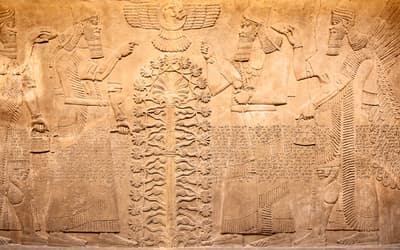
The Mesopotamian Deluge Accounts: Neither History Nor Revelation
Jason W. Landless • Sept. 30, 2020
The deluge poems of Mesopotamia are soaked in a moral and theological framework that is not just different from Genesis but utterly hostile to it.

Louis Agassiz and Alexander Winchell: Two Case Histories of Creationists Who Illustrate That Rejecting Genesis Influences the Acceptance of Racism
Dr. Jerry Bergman • Sept. 23, 2020
Theories that attempted to harmonize evolution and the Scriptures gave birth to, and perpetuated, a form of scientific racism based on Darwinism.

Inerrancy and Biblical Authority: How and Why Old-Earth Inerrantists Are Unintentionally Undermining Inerrancy
Dr. Terry Mortenson • Sept. 16, 2020
The old-earth signers of the CSBInerrancy unintentionally violated their own principles of interpretation and unintentionally undermined the inerrancy and the authority of Scripture.

It’s for the Birds: Avian Fine-Tuning of Flood Chronology
Dr. Steven W. Boyd • Aug. 26, 2020
Genesis 8:5–13 reveals the character of Noah and delimits the time of the water’s becoming powerful to between 16 and 23 days after the Flood began.

The Firmament: What Did God Create on Day 2?
Dr. Terry Mortenson • Aug. 19, 2020
Considerable disagreement exists in the church about what God made on the second day of Creation Week in Genesis 1.

Effects of the Fall on the Physical Creation: A Biblical Analysis
Zachary Klein , et. al. • Aug. 12, 2020
To interpret the natural world through the lens of Scripture, one must have a correct understanding of the Fall and its effects on the physical creation.

Heat Problems Associated with Genesis Flood Models—Part 3: Vapour Canopy Models
William Worraker • Aug. 5, 2020
The biblical and scientific arguments for a pre-Flood vapour canopy do not support the theory.

Heat Problems Associated with Genesis Flood Models—Part 2: Secondary Temperature Indicators
William Worraker • Sept. 18, 2019
The Genesis Flood produced drastic geological changes involving extremely energetic processes which also generated an enormous heat load.

How Scholars’ Perceptions of the Semantic Range of יוֹם Have Affected Their Discussions of the Age of the Universe: Part 3
John C. P. Smith • July 17, 2019
The study looks at delineations and definitions of יוֹם in Scripture, and in lexical and other sources.

How Scholars’ Perceptions of the Semantic Range of יוֹם Have Affected Their Discussions of the Age of the Universe: Part 2
John C. P. Smith • April 24, 2019
There is a considerable disconnection between lexicography regarding יוֹם and the formation of creation theology.

How Scholars’ Perceptions of the Semantic Range of יוֹם Have Affected Their Discussions of the Age of the Universe: Part 1
John C. P. Smith • March 13, 2019
There is a considerable disconnection between lexicography regarding יוֹם and the formation of creation theology.

Critical Analysis of Hugh Ross’ Progressive Day-Age Creationism Through the Framework of Young-Earth Creationism
David McGee • Feb. 13, 2019
The most important part of the debate between views on creationism is about the presuppositions of each group and their biblical hermeneutics.

Testing a Flat-Earth Prediction: Is the Moon’s Light Cooling?
Dr. Danny R. Faulkner • Jan. 9, 2019
Flat-earthers often claim that moonlight has a cooling property. I present the results of three independent experiments that test this claim.

Syntactical Features of Hebrew Genitive Clauses and Their Implications for Translating Genesis 1:1
Dr. Joshua D. Wilson • Dec. 19, 2018
It is highly improbable that Genesis 1:1 contains a genitive clause, and it is equally improbable that the verse could be rendered with a dependent clause.

Refuting Dubious Claims Regarding Natural Selection
Dr. Jason Lisle • Dec. 5, 2018
Randy Guliuzza has made some controversial claims regarding the cause and nature of adaptation of organisms to their environment. We examine his claims.

The Most High and the Axiology of Genesis 1: Could God Create Everything Good from the Beginning?
Callie Joubert • Nov. 14, 2018
It is not unintelligible that God created everything good from the beginning; it is only unintelligible to the person who makes the claim.

Heat Problems Associated with Genesis Flood Models—Part 1: Introduction and Thermal Boundary Conditions
William Worraker • July 11, 2018
The Genesis Flood produced drastic geological changes involving extremely energetic processes which also generated an enormous heat load.

Numerical Modeling of the Large-Scale Erosion, Sediment Transport, and Deposition Processes of the Genesis Flood (Revised)
Dr. John Baumgardner • June 27, 2018
This paper describes a numerical model for investigating the large-scale erosion, transport, and sedimentation processes associated with the Genesis Flood.
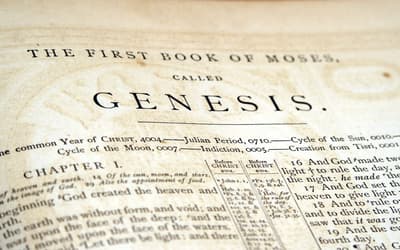
The Hermeneutics of Adam: A Figurative Approach to Genesis 1 and the Historicity of Adam1
Todd S. Beall • March 7, 2018
It is here argued that the best interpretation is that Adam and Eve are real, historical persons.

Linguistic Traits of Hebrew Relator Nouns and Their Implications for Translating Genesis 1:1
Dr. Joshua D. Wilson • Feb. 28, 2018
For nearly a thousand years a small group of proponents have argued for a different translation of Genesis 1:1.

Colossal Water Flows During Early Creation Week and Early Flood
Harry Dickens • Sept. 27, 2017
North America’s Proterozoic geology provides evidence for enormous erosion and the formation of extensive water flow systems, even spanning the continent.

Methuselah’s Begetting Age in Genesis 5:25 and the Primeval Chronology of the Septuagint: A Closer Look at the Textual and Historical Evidence
Henry B. Smith, Jr. • Aug. 2, 2017
The strong likelihood is that the primeval chronology of the Septuagint reflects most of the numbers that Moses originally recorded in Genesis 5 and 11.

Phenomenological Language and Semantic Naïveté
Kevin Short • June 28, 2017
Denis Lamoureux seeks to resolve perceived contradictions between science and Scripture by persuading that Scripture is not inerrant.

Blessed Be Assyria
Gregory D. Cook • Dec. 14, 2016
Judgment in Nahum follows the pattern of Babel. God would come down, incapacitate a rebellion, and scatter rebels. This contradicts a widely-held belief.

Do Varves, Tree-Rings, and Radiocarbon Measurements Prove an Old Earth?
Dr. Jake Hebert , et. al. • Dec. 7, 2016
The BioLogos Foundation published a popular-level article by old-earth geologists Gregg Davidson and Ken Wolgemuth presenting arguments for an old earth.

Scriptural Geology, Then and Now
Warren H. Johns • Nov. 30, 2016
The place of the biblical Flood in the geological record remains one of the most hotly debated issues among creationist geologists today.

The Nature of the Neo-Darwinian Evangelicals’ Criticism of Young-Earth Creationists
Jim Owen • Nov. 23, 2016
If we do not understand the dimensions of the war we are engaged in, we are already halfway to theological and historical oblivion.

A Critique of Scientific Explanations of Belief and Unbelief and the Conflict between Evolution and Creationism
Callie Joubert • Nov. 2, 2016
The recent claim that “conflicting networks” in the brain that explain belief and unbelief in God cannot be true.

An Exponential Decay Curve in Old Testament Genealogies
Philip M. Holladay • Oct. 19, 2016
The lifespans of Old Testament people born after the Flood reveal a numerical pattern known as an exponential decay curve.
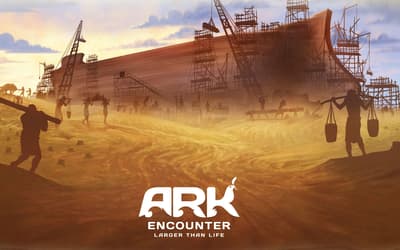
The Last Week before the Flood
Dr. Steven W. Boyd • Aug. 17, 2016
While attempting to elucidate the general chronological profile of the events of the first week, we hope to answer two specific significant questions.

Comments on Ussher’s Date of Creation
Dr. Danny R. Faulkner • July 20, 2016
Ussher’s date of creation of October 23, 4004 BC appears to rely upon two questionable assumptions.
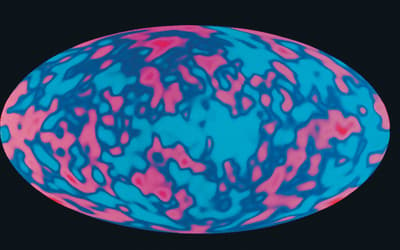
Thoughts on the rāqîa‘ and a Possible Explanation for the Cosmic Microwave Background
Dr. Danny R. Faulkner • March 23, 2016
Dr. Danny Faulkner proposes that Genesis 1:1 is an introductory encapsulation that establishes a foundation for building a biblical model of astronomy.

Numerical Modeling of the Large-Scale Erosion, Sediment Transport, and Deposition Processes of the Genesis Flood
Dr. John Baumgardner • Feb. 24, 2016
Accounting for thick sediment sequences blanketing the surfaces of the continents is a paramount issue for understanding physical aspects of the Genesis Flood.
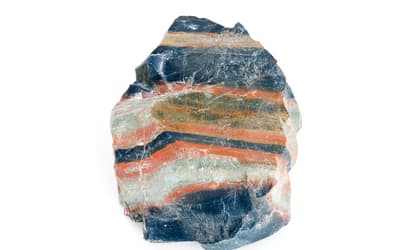
Terrestrial Vertebrates Dissolved Near Flood Fountains
Harry Dickens , et. al. • Nov. 18, 2015
Terrestrial vertebrates close to the Flood fountains dissolved then precipitated out to form Precambrian-Cambrian sedimentary phosphate deposits.

The Lost World of Adam and Eve: A Response
Steve Ham • July 29, 2015
This paper contends that Walton has given a magisterial authority to the ANE mythic texts in order to interpret the Genesis accounts.

Worldview Bias and the Origin of Hebrew Worship
Scott Aniol • July 15, 2015
Secularists claim that similarities between Israel’s worship and that of other nations in the OT prove Israel’s worship was rooted in its neighbors religion.

How Long Did the Flood Last?
Dr. Danny R. Faulkner • May 13, 2015
Belief that the Flood lasted 371 days is common among recent creationists, but there are other possibilities.

Physical Difficulties with Hugh Ross’ Local Flood Model
Dr. Danny R. Faulkner • April 15, 2015
There are at least three problems with Hugh Ross’ local flood model which render it physically impossible. This is in addition to numerous biblical issues.

A Review of Hugh Ross’ Latest Book, Navigating Genesis
Dr. Danny R. Faulkner • April 15, 2015
While many Christians support Ross’ broad conclusions, few would agree with the details of Dr. Ross’ argument.

Can One Astronomically Date the Flood within the Hydroplate Model?
Dr. Danny R. Faulkner • April 1, 2015
Dr. Danny Faulkner analyzes Dr. Walt Brown’s determination of the date of the Flood within his hydroplate model using the orbits of two comets.

Parasitology and Creation
Dr. Matthew E. Ingle • Feb. 4, 2015
As we learn more about parasites, which don’t seem to be “good” design, we will understand better how the parasitic lifestyle resulted from the Fall.

A Reply to Bruce Gordon’s Biblical Critique of Young-Earth Creationism
Ashby L. Camp • Jan. 28, 2015
Dr. Gordon recently published a critique of the claims of young-earth creation. This reply is to the biblical criticisms in his paper.

A Biblical Creationist Cosmogony
Dr. John G. Hartnett • Jan. 14, 2015
The cosmogony proposed is consistent with all creationist understandings of the biblical texts and has no light-travel time problem.

Critique: Faulkner’s Miraculous Translation of Light Model Would Leave Evidence
Dr. John G. Hartnett • Nov. 19, 2014
In 2013 D. R. Faulkner proposed what he says is a new solution to the biblical creationist starlight travel-time problem.

Fossil Baramins on Noah’s Ark: The “Amphibians”
Dr. Marcus Ross • Sept. 17, 2014
When added to previously determined kinds of extant anurans, caudates, and gymnophionans, a total of 248 amphibian kinds may have been brought on board the Ark.

Evaluating The Day Four Cratering Hypothesis
Wayne Spencer • Sept. 10, 2014
Creationists have recently considered impact cratering in the solar system occurring during the fourth day of the Creation Week.

Defending History: Temporal Reasoning in Genesis 2:7–3:8
Dr. Steven W. Boyd • Aug. 6, 2014
Creationist studies are replete with discussions of Genesis 1:1–2:3 and 5:28–9:29, but Genesis 2:4–3:24, has remained largely untouched.

An Initial Estimate toward Identifying and Numbering Extant Tuatara, Amphisbaena, and Snake Kinds
Tom Hennigan • Feb. 19, 2014
The purpose of this paper is to use all available information in order to make an initial estimate of the identification and numbers of extant Lepidosaur kinds, except for the “lizards.”

Interpreting Craters in Terms of the Day Four Cratering Hypothesis
Dr. Danny R. Faulkner • Jan. 22, 2014
In recent years there has been increasing discussion of craters within the creation paradigm.

An Initial Estimate toward Identifying and Numbering the Ark Turtle and Crocodile Kinds
Tom Hennigan • Jan. 8, 2014
Biosystematics is in great flux today because of the plethora of genetic research continually shedding light on organism relationships.

An Initial Estimate of Avian Ark Kinds
Dr. Jean Lightner • Nov. 27, 2013
This paper will focus on identifying extant bird kinds.

The Second Law of Thermodynamics and the Curse
Dr. Danny R. Faulkner • Nov. 13, 2013
Many recent creationists believe that the second law of thermodynamics came into being as a result of the Fall or the curse. I argue that this is not supported by Scripture nor science.

Jesus, Scripture and Error: An Implication of Theistic Evolution
Simon Turpin • Oct. 30, 2013
The very teachings of Jesus are being attacked by those who state that, because of His human nature, there is error in some of His teaching regarding earthly things such as creation.

Chimeras, Cybrids, and Hybrids: A Christian’s Observations and Critique of Some Aspects of the Controversy Involving the Mixing of Human and Animal Materials for Scientific Research
Callie Joubert • Sept. 18, 2013
On July 22, 2011, some readers of the Daily Mail UK were stunned by news that “Scientists have created more than 150 human-animal embryos in British laboratories.”

A Proposal for a New Solution to the Light Travel Time Problem
Dr. Danny R. Faulkner • Feb. 23, 2014
Danny R. Faulkner, AiG–U.S., lays groundwork for the beginning of a new solution to the light travel time problem.

The Importance of an Historical Adam
Simon Turpin • May 29, 2013
In secular culture it is common to view the biblical history of Adam as a story, myth, or a parable but this is now also becoming the standard interpretation for many within the evangelical community.

Is There a Dominion Mandate? Discussion: A Response to Darek Isaacs
Tom Hennigan • May 1, 2013
Thomas D. Hennigan responds to Darek Isaacs’ paper, “Is There a Dominion Mandate?”

Is There a Dominion Mandate? Reply: A Response to Hennigan, Kulikovsky, and McDurmon
Darek Isaacs • May 1, 2013
Darek Isaacs responds to the challenges to his paper, “Is There a Dominion Mandate?”

Is There a Dominion Mandate? Discussion: The Dominion Mandate: Yesterday, Today, and Forever
Joel Mcdurmon • May 1, 2013
Joel McDurmon responds to Darek Isaacs’ paper, “Is There a Dominion Mandate?”

Is There a Dominion Mandate? Discussion: In Defense of Human Dominion
Andrew Kulikovsky • May 1, 2013
Andrew S. Kulikovsky responds to Darek Isaacs’ paper, “Is There a Dominion Mandate?”

Did Death of Any Kind Exist Before the Fall?
Simon Turpin • April 3, 2013
Death, whether animal or human, physical or spiritual, is a consequence of man’s disobedience toward his Creator and an intrusion into His “very good” creation.

Evangelical Commentaries on the Days of Creation in Genesis One
Simon Turpin • March 20, 2013
This paper will evaluate and critique six commentaries and the reasons they give for not taking the days of creation literally.

A Further Examination of the Gospel in the Stars
Dr. Danny R. Faulkner • Feb. 6, 2013
While well intended, the gospel in the stars is fraught with problems, and Christians are discouraged from using it.

An Initial Estimate Toward Identifying and Numbering Amphibian Kinds within the Orders Caudata and Gymnophiona
Tom Hennigan • Jan. 23, 2013
An initial attempt to count and identify biblical kinds in amphibian orders Caudata and Gymnophiona were estimated using current information and several key assumptions and guidelines.

Is There a Dominion Mandate?
Darek Isaacs • Jan. 9, 2013
The dominion mandate is not named nor defined in Scripture, and so offering a deeper definition, which everyone can agree on, is not possible. However, it is possible to locate where the idea is found
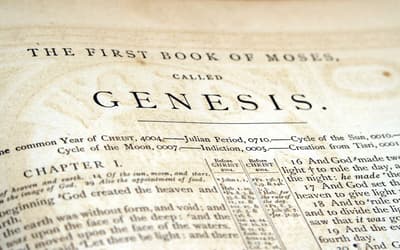
Creation Date of Adam from the Perspective of Young-Earth Creationism
David McGee • Nov. 28, 2012
This article reveals how young-earth creationists have concluded the approximate age of Adam and to explain the reason for a 6,000 year range between both groups.

Is Young-Earth Creationism a Bad Choice?
Callie Joubert • Nov. 14, 2012
Any understanding of Scripture that excludes or indicts the divine Himself is necessarily flawed and false.

Mammalian Ark Kinds
Dr. Jean Lightner • Oct. 31, 2012
Information on the class Mammalia was evaluated in an attempt to get a realistic estimate of what mammalian kinds would have been represented on the Ark.
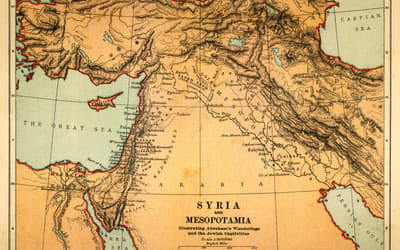
Abraham and the Chronology of Ancient Mesopotamia
Matt McClellan • Oct. 3, 2012
For many years, Abraham was believed to have lived at the same time as Hammurabi, king of Babylon. Later scholars would date Abraham to the period shortly before the reign of Hammurabi.

The Unbeliever at War with God: Michael Ruse and the Creation-Evolution Controversy
Callie Joubert • Sept. 5, 2012
The evidence to be considered will indicate that a fear of God and afterlife play a major role in the psychology of unbelief, and that points toward the realism of Scripture.

Parallelism in Hebrew Poetry Demonstrates a Major Error in the Hermeneutic of Many Old-Earth Creationists
Dr. Tim Chaffey • July 25, 2012
This article will provide a survey of the nature of Hebrew poetry and provide examples of the various forms of parallelism exhibited in the six poetic books of the Bible.

Theistic Evolution: An Incoherent and Inconsistent Worldview?
Callie Joubert • July 11, 2012
Christians are caught up in theistic evolutionism without realizing that the worldview of theistic evolutionism is incoherent and inconsistent with the teachings of Scripture.

Review of John Lennox’s Book Seven Days That Divide the World: The Beginning According to Genesis and Science
Simon Turpin • June 27, 2012
Lennox reasons that the church has been wrong in the past over its interpretation of Scripture in light of scientific discovery, and that those holding to a young earth are wrong again.

What Makes Us Human, and Why It Is Not the Brain: A Creationist Defense of the Soul: Reply
Callie Joubert • June 13, 2012
To depart from Scripture at any point is neither safe nor right. Thus Estabrook’s discussion of my paper (Joubert 2011) in which he expressed his difficulties with my defense of the soul is welcome.

What Makes Us Human, and Why It Is Not the Brain: A Creationist Defense of the Soul: Discussion
Darrell Estabrook • June 13, 2012
Certainly there is more to humans than a complex brain architecture from which a mind would seem to emerge. However, this reader has two difficulties.

Can Theistic Evolutionism Explain the Origin of Morality?
Callie Joubert • March 14, 2012
Theistic evolutionism is not only inconsistent with Scripture but also philosophically incoherent.

What Makes Us Human, and Why It Is Not the Brain: A Creationist Defense of the Soul
Callie Joubert • Dec. 14, 2011
A Christian view of the world entails that science is not a Christian’s ultimate or sole source of knowledge and the physical world is not the only world there is.

Untangling Uniformitarianism, Level II: Actualism in Crisis
Dr. John K. Reed • Nov. 30, 2011
Although the term uniformitarianism was not introduced until 1832, the concepts that Lyell so cleverly fused together had already been operating in the nascent discipline of geology for some decades
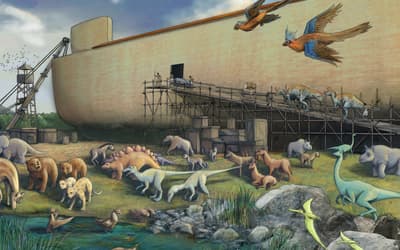
Determining the Ark Kinds
Dr. Jean Lightner , et. al. • Aug. 1, 2014
This research effort provides information necessary for the best possible reconstruction of the animal kinds preserved on the Ark for the Ark Encounter.

Adam, Free Choice, and the Cause of Sin: A Creationist Response to a Christian Evolutionist
Callie Joubert • Oct. 26, 2011
This paper will show that Christian professor Daniel Brannan’s arguments are based on faulty premises regarding Adam’s constitutional nature, the nature of Adam’s perfection and Adam’s free choice.

Ancient Egyptian Chronology and the Book of Genesis
Matt McClellan • Aug. 24, 2011
This paper will look at the different possibilities that can be constructed concerning how long each dynasty lasted and how they relate to the biblical dates of the Flood, Tower, and Patriarchs.

Emergentism and the Rejection of Spirit Entities: A Response to Christian Physicalists
Callie Joubert • Aug. 10, 2011
Emergentism defies commonsense; there is also no scientific evidence that something material could produce an entity of a kind radically different from itself.

Created Kinds and Essential Natures: A Biblical and Philosophical Response to Evolutionists
Callie Joubert • July 27, 2011
Assuming that “natural kind” is a merely biological rather than metaphysical would be a mistake, resulting in Christians having difficulty evaluating and correcting rival views to created kinds.

An Examination of Augustine’s Commentaries on Genesis One and Their Implications on a Modern Theological Controversy
Dr. Tim Chaffey • July 13, 2011
Few individuals in church history are as popular as Augustine of Hippo. Old-earthers claim him as support for figurative interpretations of Genesis 1. But what did Augustine really say?

Where in the World Is the Tower of Babel?
Anne Habermehl • March 23, 2011
This biblical story is believed by many to be the record of a real historical event that took place after the worldwide Flood, at a time when the earth’s population still lived together in one place.

Toward an Accurate Model of Variation in DNA
Mitchel Soltys • March 2, 2011
The Bible’s description of created kinds implies an information model which uses variables. The findings in this paper show that a model which uses variables forms a basis for understanding biology.

Beyond Distant Starlight: Next Steps For Creationist Cosmology
James Upton • Jan. 26, 2011
On both large and small cosmic scales there is a diverse range of trends, patterns, and phenomena that beckon some kind of explanation.

Anisotropic Synchrony Convention—A Solution to the Distant Starlight Problem
Dr. Jason Lisle • Sept. 22, 2010
Clear biblical teaching is that the universe is only a few thousand years old, so we should only be able to see objects within a radius of 6,000 light years.

Untangling Uniformitarianism
Dr. John K. Reed • March 17, 2010
Of the nine terms associated with uniformitarianism, seven can be replaced or eliminated, which refutes the accusation that diluvialists do not understand uniformitarianism.
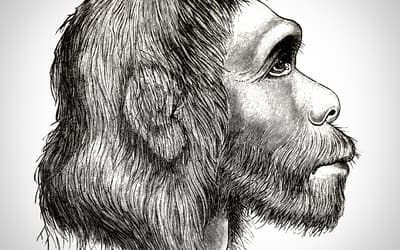
Those Enigmatic Neanderthals
Anne Habermehl • Jan. 13, 2010
Young-earth creationists rightly consider that Neanderthals were human, but are divided on various issues.

Fraud and Forgery in Paleoanthropology
Dr. Jerry Bergman • Dec. 23, 2009
A review of the history of paleoanthropology leads to the conclusion that the discipline is far less objective than that for physics, chemistry, or even biology.

Systematic Theology Texts and the Age of the Earth
Dr. Terry Mortenson • Dec. 16, 2009
In the past few decades there has been a growing controversy in society and in the Church over evolution and the age of the earth.

Christian Theodicy in Light of Genesis and Modern Science
Dr. Terry Mortenson • Nov. 11, 2009
The problem of evil is always a challenge for the Christian witness. However, William Dembski’s “solution” proves logically and biblically unsound.

Chalk and “Upper Cretaceous” Deposits are Part of the Noachian Flood
John Matthews • March 25, 2009
Certain features of the “Upper Cretaceous” period correspond closely with the biblical account of the Noachian Flood around day 150, and uniformitarian explanations for “chalk” are inadequate.

A Brief History of Intolerance in Modern Cosmology
Dr. Jerry Bergman • Jan. 21, 2009
A review of some recent well-documented cases of intolerance in the cosmology field illustrates a common problem in science. Many relate to the Big Bang theory.

Hebrew Metaphysic
Doug Kennard • Dec. 31, 2008
Metaphysical development in Hebrew biblical texts is especially elucidated through a series of word studies with a shifting emphasis that each cross-pollinates the others.

The Origin of Oil—A Creationist Answer
John Matthews • Dec. 17, 2008
The dominant view of the origin of oil amongst western oil companies until 1969 was that it was due to the decay of living matter. Now other views are making themselves heard.

Radiocarbon Ages for Fossil Ammonites and Wood in Cretaceous Strata near Redding, California
Dr. Andrew A. Snelling • Dec. 10, 2008
Measurable radiocarbon has been detected in fossils from the earliest days of radiocarbon dating. When these data are put in perspective, their deadly significance to uniformitarianism is apparent.

Bacterial Attenuation and its Link to Innate Oncolytic Potential
Luke Kim • Oct. 15, 2008
Although bacteria have been mainly recognized as disease causing agents, there are abundant scientific evidences that bacterial pathogenicity is not the major biological function of bacteria.

Green River Formation Very Likely Did Not Form in a Postdiluvial Lake
Michael J. Oard , et. al. • Sept. 24, 2008
The uniformitarians believe that the couplets in the Green River Formation are varves, but evidence militates against this interpretation

Karyotype Variability within the Cattle Monobaramin
Dr. Jean Lightner • June 11, 2008
Chromosomal rearrangements, particularly centric fusions, have played an important role in developing the chromosomal patterns that are seen in cattle today.

Toward a Practical Theology of Peer Review
Todd Charles Wood , et. al. • April 9, 2008
The irony of the conflict over peer review is that peer review is poorly understood and criticized even in conventional journals.

Testing the Hydrothermal Fluid Transport Model for Polonium Radiohalo Formation: The Thunderhead Sandstone, Great Smoky Mountains, Tennessee–North Carolina
Dr. Andrew A. Snelling • March 26, 2008
The regional metamorphism, the hydrothermal fluid flows, the cooling of the regional metamorphic complex, and the formation of the Po radiohalos all had to have occurred within a few weeks.

Louis Pasteur’s Views on Creation, Evolution, and the Genesis of Germs
Dr. Alan L. Gillen , et. al. • Dec. 27, 2020
Shortly after Darwin published On the Origin of Species, Pasteur began to challenge the idea of spontaneous generation.

An Apology and Unification Theory for the Reconciliation of Physical Matter and Metaphysical Cognizance
Desmond Allen • Feb. 27, 2008
Because one is tangible and the other intangible, the physical and metaphysical are generally treated separately. But this dichotomy is illogical.
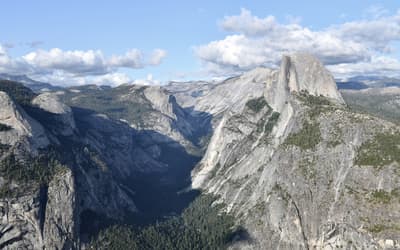
Catastrophic Granite Formation
Dr. Andrew A. Snelling • Feb. 6, 2008
The timescale for the generation of granitic magmas and their subsequent intrusion, crystallization, and cooling as plutons is no longer incompatible with the biblical time frames.
Genesis on Answers Research Journal
The English title “Genesis” comes from the Septuagint’s (LXX’s) translation ΓΕΝΕΣΙΣ and means “origin.” The Hebrew title for the Book of Genesis is בראשית, which is the first word in the Hebrew Bible, and translates into English as “In the beginning.” These Greek and Hebrew titles appropriately describe Genesis, as it documents the origin and beginning of all things excluding God Himself, who has no beginning. Genesis encompasses the history of the world from Creation until the time of Joseph in Egypt. Genesis is the first book of the Pentateuch (meaning five books, referring to Genesis, Exodus, Leviticus, Numbers, and Deuteronomy) and was written by Moses.
The 50 chapters of Genesis detail the origin of creation, humanity, marriage, sin, death, sacrifices, family, society, government, languages and ethnic groups, the nation of Israel, and the promises and covenant God made with Abraham, Isaac, and Jacob. Genesis even records the introduction to God’s plan for redemption through Jesus in the Protoevangelium (Genesis 3:15) and Abrahamic Covenant (Genesis 12:1–3, 7). Every major doctrine in Scripture either directly or indirectly has its foundation in the Book of Genesis.
Genesis 1–11 contains several significant events, such as Creation, humanity being created in the imago Dei, the Fall, Noah’s Flood, and the Tower of Babel. Genesis 1–11 is often referred to as primeval history and is interpreted differently than the other 39 chapters of Genesis. However, the background these early chapters provide for the rest of the book, genealogical ties between chapters 1–11 and chapters 12–50, the Hebrew text itself, the toledoth structure of the book, and the rest of Scripture’s testimony about Genesis 1–11 reject this false division. Genesis 1–11 is written in historical narrative and should be read as accurate and literal history, not mythohistory.
These papers written in the Answers Research Journal (ARJ) defend the historicity of Adam and Eve and the other people and events contained within Genesis 1–11. They refute efforts to interpret the events of Genesis 1–11 in a figurative, metaphorical, mythical, poetical, or any other culturally-dependent manner which is determined by ancient Near Eastern literature. The account of origins presented in Genesis 1–11 is a simple but factual presentation of actual events, and therefore, provides a reliable framework for scientific research into the question of the origin and history of life, mankind, the earth, and the universe.
